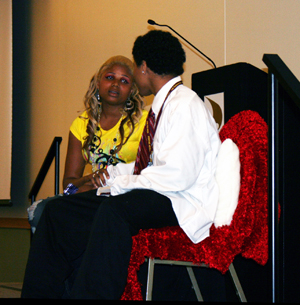 |
A pair of students act out a skit during the Learning Achievement Coalition-Oakland's first-ever Student Leadership Conference, held Friday on the campus of Oakland University.
|
Rochester, Mich. – About 350 10th- and 11th-grade students from 50 Oakland County high schools joined their principals and other area educational leaders on the campus of Oakland University on Friday to better understand the roles they can play as leaders addressing the problems of academic achievement and opportunity gaps that separate some social groups.
The Learning Achievement Coalition-Oakland (LAC-O) – comprised of representatives from the 28 Oakland County school districts, Oakland Schools and Oakland University – held its first-ever Student Leadership Conference as part of a mission to close the gaps that separate people of various racial and socio-economic groups.
To help get students inspired during the conference, youth mentor, author and acclaimed motivational speaker Marlon Smith presented an entertaining and inspirational keynote address.
"There is greatness in this room," he said. "I know you're all the crème de la crème here, but the question is, how are you going to make a difference for other students?"
In order to achieve their personal goals and to help improve opportunities for others, Smith told the students they must not let fear stand in their way. He challenged them to always imagine the worst thing that could happen if they try something courageous to achieve their goals, and more importantly, what it will cost them in terms of regret if they let fear stand in their way and do not seize the opportunity.
"There is no such thing as failure; there are only results. And if they're not the results you want, you can change your strategy to get the results you want," Smith said. "You'll never walk into your greatness … you'll never be true leaders … if you don't first step into your fear."
Following the Smith's presentation, students attended a diverse array of presentations and discussions ranging from educational policy and Internet hate groups to hip-hop culture and white privilege. Event organizers designed these breakout sessions to have students work "outside their comfort zones," or to be more specific, in highly diverse groups.
"I've never really met other people from other schools in my district, or from other districts," said Pontiac High School sophomore Molly Powers. "To hear their opinions on things we all think are important I think is interesting."
Powers added that the exchange she and others had on Friday will encourage students to begin talking about issues that persist, at least in part, because, as of yet, there is no diverse and wide-reaching dialogue focusing on ways to overcome these issues.
"You broaden your own knowledge by hearing other people's ideas. You hear things and think, 'That's new, that's fresh," she explained. "The important point of this is to break down those barriers."
Following the breakout sessions, students met with their principals to develop action plans that would both expand dialogue between students of different backgrounds and begin to address the issue of why some groups fall behind.
Through work such as assessing current school cultures and developing strategies to engage students, parents, teachers and administrators, the LAC-O Student Engagement Committee hopes to foster nurturing, caring, supportive and challenging school cultures that encourage high achievement, respect individual differences, honor student voices and focus on the needs of all students. Learning opportunities during Friday's conference incorporated these goals.
LAC-O leaders are exploring whether they can invite some Student Leadership Conference participants to an intense and immersive summer retreat that focuses on enhancing local action plans and integrating them into a countywide model.
Event organizers considered Friday's event an tremendous success given the enthusiasm with which students and their principals engaged in activities. Local educational leaders look forward to that same enthusiasm materializing at schools in the students' home districts.

